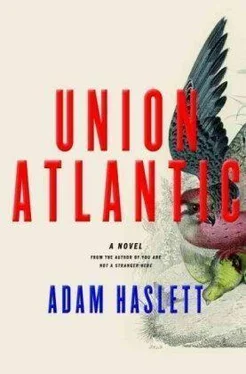“We’re being honest here, Mr. Fanning? Is that the idea?”
“Absolutely. But if you give me a second, I think I know what you’re thinking: ‘Last night I discover a gaping hole in one of Fanning’s trader’s scrub accounts and this morning he’s in my office offering me a vice presidency. How easy does he think I am?’ Am I in the ballpark?”
“Yes,” she said, resting back in her chair. “You are.”
“McTeague fucked up. Thanks to you, I spent last night on the phone figuring out what happened. It was a favor for a client. I’ve spoken to him about it, and it’ll be worked out. Now, just to be clear,” he said, “do I want compliance getting their nose in this? No. Do I read employee e-mail, including yours? Obviously. If you don’t already, you will once you move into operations. You’d be negligent not to.”
“So you’re asking me to keep quiet about a possible loss of three hundred million, not to mention a reporting violation?”
“You’re not keeping quiet. I’m his supervisor and I’ve been notified. What I’m saying is this is how the chairman’s office wants to handle the matter. It’s how I want to handle the matter. But part of you is still thinking, ‘He’s only here because he’s got a problem and there wouldn’t be any of this talk about a vice presidency otherwise.’ That’s not wrong, of course. It’s just not the whole picture. The situation brought you to my attention, that’s true, but the fact is I think the bank would make more money if we promoted you. And that’s what we’re here for, right? You’re not a romantic about that, I hope — our purpose?”
“I’m not an innocent,” she said. “If that’s what you mean.”
Doug leaned far enough forward to get a sidelong glance at the framed photographs. In one, a vacation shot, Evelyn and two other women smiled for the camera at an outdoor table under a parasol, a beach in the background. The one beside it appeared to be a family portrait: an older black woman in a blue dress seated in the middle, a much younger Evelyn standing over one of her shoulders, a boy of about fifteen resting his hand on the other.
“Is this your family?”
Her gaze hardened.
“No disrespect, Mr. Fanning, but I’m getting the sense that you already know more about me than I’d care to tell.”
The offer of promotion had begun as a piece of improvisational bullshit but he was beginning to think it might not be a bad idea.
“I only ask because while I never had a brother—”
“Don’t go there,” she said. “You don’t want to go there.”
“Why not? Because we don’t know each other? I’m not offering sympathy, if that’s what you think. I just know enough to know remorse can fuck with your ambition. And you shouldn’t let it.”
“You’re one hell of a condescending asshole.”
Doug smiled at the pureness of her hostility.
“When can you start?” he asked.
He thought she might leap up and swat him across the face but instead she simply shook her head in wonder.
BY THE TIME Doug headed out for his lunch meeting with Mikey, Sabrina still hadn’t been able to track down McTeague.
“Call me as soon as you hear from him,” he told her, on his way out of the office.
He walked quickly up toward the Common, where the benches were full of legislative staffers and store clerks, eating their bag lunches. The gold dome of the State House glittered in the midday sun. After Manila or Seoul or New York, Boston had always appeared quaint to Doug, an unlikely town for the business he and Holland had created. The spirit of their venture would have made more sense in boom-towns like Phoenix or Charlotte. But they had worked well with the material at hand, letting the historical distinction of the place act as a kind of ambient reassurance, a patina of solidity worth tens of millions in advertising.
In a booth at the back of the restaurant, he found Mikey muttering into the wire that dangled from his ear. He was jotting notes along the side of his Herald , the far page of which had come to rest on a half-eaten plate of manicotti from which it sponged the pasta’s thin red juice.
“You’re late and you look like hell,” he said. “Have a seat.” Pushing the wire aside, he said, “I got an investigator following this orthodontist out in Weston. Guy owes a boatload of child support. Turns out all his money’s going for OxyContin. I got to say if you met the wife you’d understand the painkillers. She’s quite a human being. Third husband, fourth investigator. I’m just waiting for my guy to tell me he got the pictures of him coming out of the pharmacy.”
He didn’t have time for this, Doug thought, checking his Black-Berry only to find the Nikkei was down another hundred points.
All day from his office window he could see into the neighboring tower, where workers clicked away at their screens, filling their filing cabinets with endless records of prices and depreciations and liabilities likely to pay, until they no longer noticed the bargain struck between meaningless days and whatever private comforts they’d found to convince themselves the meaninglessness was worth it. But it was different if those workers were your muscles and tendons and by your will you directed their exertion, regulating the blood of cash. Then you weren’t an object of the machine. You were something different: an artist of the consequential world. A shaper of fact. Not the kind of author Sabrina wanted to be — some precious observer of effete emotion — but the master of conditions others merely suffered.
That’s what he didn’t like about McTeague’s freelancing like this. Doug wasn’t in control.
“So,” Mikey said, “we got this hearing with Miss Graves on Monday. You’ll be there, right?”
“What for?”
“To give the victim a face,” he said, waving the waiter over. “We don’t want her getting a sympathy vote. Old-lady-against-faceless-enemy kinda thing. Trust me, this is what you pay me for.”
“You told me it was bullshit. Now you make it sound like a tobacco trial.”
“You’ll be in and out in half an hour.”
“I caught her trespassing this morning. Should we mention that to the judge?”
“Let her tie her own noose.”
Glancing over Mikey’s shoulder, Doug saw a guy at a table by the window, early twenties, dressed in expensively faded jeans and a sweater pre-patched at the elbows. He was leafing through a magazine, the white wires of his earphones trailing down into his pocket, a laptop open beside him. He saw these people everywhere now, these aging children who had done nothing, borne no responsibility, who in their bootless, liberal refinement would judge him and all he’d done as the enemy of the good and the just, their high-minded opinions just decoration for a different pattern of consumption: the past marketed as the future to comfort the lost. And who financed it? Who loaned them the money for these lives they couldn’t quite afford with their credit cards and their student loans? Who else but the banks? And what was he reading? GQ or Men’s Health? Some article telling him how to shave his nuts or pluck his eyebrows or sculpt his tender gut? His hair was carefully unkempt, shiny with product, a deliberately stray curl hanging down over his forehead.
“Now what do you want to eat?” Mikey said. “Pasta? Chicken Parm? What’s it gonna be.”
Last night, Nate had turned over in his sleep and nuzzled up against Doug, his arm coming to rest across his chest. For what seemed the longest time, Doug had remained still under that warm weight, wanting to shrug it off but unable to.
“I got to go,” he said, seeing McTeague’s number appear on the screen of his phone.
“What kind of a lunch is this? You just got here.”
Читать дальше












